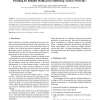Free Online Productivity Tools
i2Speak
i2Symbol
i2OCR
iTex2Img
iWeb2Print
iWeb2Shot
i2Type
iPdf2Split
iPdf2Merge
i2Bopomofo
i2Arabic
i2Style
i2Image
i2PDF
iLatex2Rtf
Sci2ools
105
click to vote
DIALM
1999
ACM
1999
ACM
Flooding for reliable multicast in multi-hop ad hoc networks
Ad hoc networks are gaining popularity as a result of advances in smaller, more versatile and powerful mobile computing devices. The distinguishing feature of these networks is the universal mobility of all hosts. This requires re-engineering of basic network services including reliable multicast communication. This paper considers the special case of highly mobile fast-moving ad hoc networks and argues that, for such networks, traditional multicast approaches are not appropriate. Flooding is suggested as a possible alternative for reliable multicast and simulation results are used to illustrate its effects. The experimental results also demonstrate a rather interesting outcome that even flooding is insufficient for reliable multicast in ad hoc networks when mobility is very high. Some alternative, more persistent variations of flooding are sketched out.
Related Content
| Added | 02 Aug 2010 |
| Updated | 02 Aug 2010 |
| Type | Conference |
| Year | 1999 |
| Where | DIALM |
| Authors | Christopher Ho, Katia Obraczka, Gene Tsudik, Kumar Viswanath |
Comments (0)

